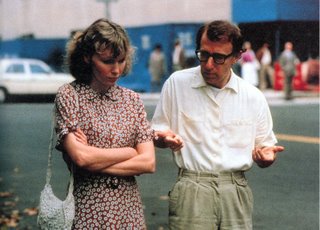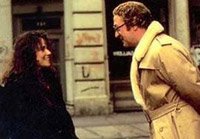Starring Mia Farrow, Dianne Wiest, Barbara Hershey, Michael Caine, Woody Allen, Max Von Sydow, Maureen O’Sullivan.
(SPOILER ALERT)
Being the third of four sisters from New York City, I related to this film in ways that surprised me. I think Woody Allen did a good job capturing the love and tension inherent in sisterly relationships.
Hannah tries to be a supportive sister, mother, wife, and daughter. She is faultless, though she probably could stand to try even harder with her oversensitive, insecure sister Holly (Dianne Wiest).
I wonder if this film is the result of a masochistic need in Woody Allen, the filmmaker, to punish Hannah for being so good (or a wish to punish Mia Farrow in real life—we all know what happened to them). Hannah is the unwitting victim in the story, though she reminds me a bit of Katherine Hepburn character in
The Philadelphia Story (1940), in terms of her flawlessness, except that Hannah is more of a victim. Also she is warm, not cold and standoffish.
 Hannah (Farrow) and ex-husband Mickey (Allen).
Hannah (Farrow) and ex-husband Mickey (Allen).Personally, I think Allen indulges a little bit with this movie in a common (?) male fantasy of sleeping with a partner’s sister. Both Hannah’s husbands sleep with one of her sisters, which I find creepy.
What I got from Michael Caine’s character, Elliot, was the idea that, generally, men want to feel needed. They want to place their wives on a pedestal but then feel guilty making love to them. They want to feel unworthy, as he seems to feel with his wife Hannah (Mia Farrow), but then will look to another to feel needed, which is what he does with Hannah’s sister, Lee (Barbara Hershey).
The film still holds up for the most part; Woody Allen films are timeless in part because of the New York scenes coupled with old jazz music. However, Allen borrows that other, reprehensible fossil of old movies: the “black servant.” Yes, the only black character in the film is a maid, who appears prominently (hard not to since she’s surrounded by white people!) in two segments of the film, but has NO speaking parts. The only other black person that comes in contact with any of the characters is a guy that rudely bumps into Woody Allen’s character on the sidewalk and keeps walking.
Like clothing styles, beauty standards have changed. Apparently the 70s and 80s saw a dip in glamour. The actors and characters they play in this film are the NY (theatre) actors; that is, they are not glitzy Hollywood types. With current standards of super white teeth and sleek glossy hair, I imagine younger audiences would have difficulty looking past “beautiful” Barbara Hershey’s brown teeth and badly permed, frizzy hair—in vogue at the time—to see what Elliot sees, even though Hershey is attractive and has a great voice. (Elliot has gigantic glasses and brown teeth, too, but he’s from the UK.) And what’s with all these attractive women with much older, unattractive men???!!!?! An indication of one of Woody Allen’s many complexes, I guess; although he did cast attractive younger men in later movies.
 Hannah's husband, Elliot (Michael Caine) trying to pick up her sister, Lee (Barbara Hershey).
Hannah's husband, Elliot (Michael Caine) trying to pick up her sister, Lee (Barbara Hershey).I was kind of dreading watching this film. Although I’ve seen a couple of later Woody Allen films that were OK, e.g. Mighty Aphrodite and Bullets Over Broadway, I didn’t know if I could sit through one this evening, with its guaranteed heavy saturation of fast, neurotic New York dialogue. I was dreading listening to Woody Allen himself, but as I watched the film, it wasn’t as bad as I expected. It’s the best one I’ve seen. Hannah and Her Sisters addresses deep, philosophical questions with a good amount of humor. Some things about the story bothered me (I can’t believe he gets away with it in the end!!!!) but I really liked the film. I loved the architecture-tour scene.
The characters Allen himself plays (“Mickey” in this film) always seem to win me over because, although they are irritating people whom I would avoid in real life, they are so funny. Dianne Wiest and Mia Farrow give wonderful performances, which are not emotionally overwrought, of course, but these actresses are perfectly suited for executing Woody Allen dialogue in a non-irritating, realistic way. I enjoyed the performance of Max Von Sydow, star of seminal Ingmar Bergman films The Seventh Seal (1957), Wild Strawberries (1957), and The Virgin Spring (1960). Despite my reservations, Hannah and Her Sisters is just too well written and the actors are too good; after watching it I feel I should have known that I was actually in for a treat.
Although I am conflicted because of the race thing, I highly recommend this film. I would watch it again, then cleanse my soul with a Spike Lee movie.
 (President Nelson Mandela does not appear in this film.)
(President Nelson Mandela does not appear in this film.)
No comments:
Post a Comment